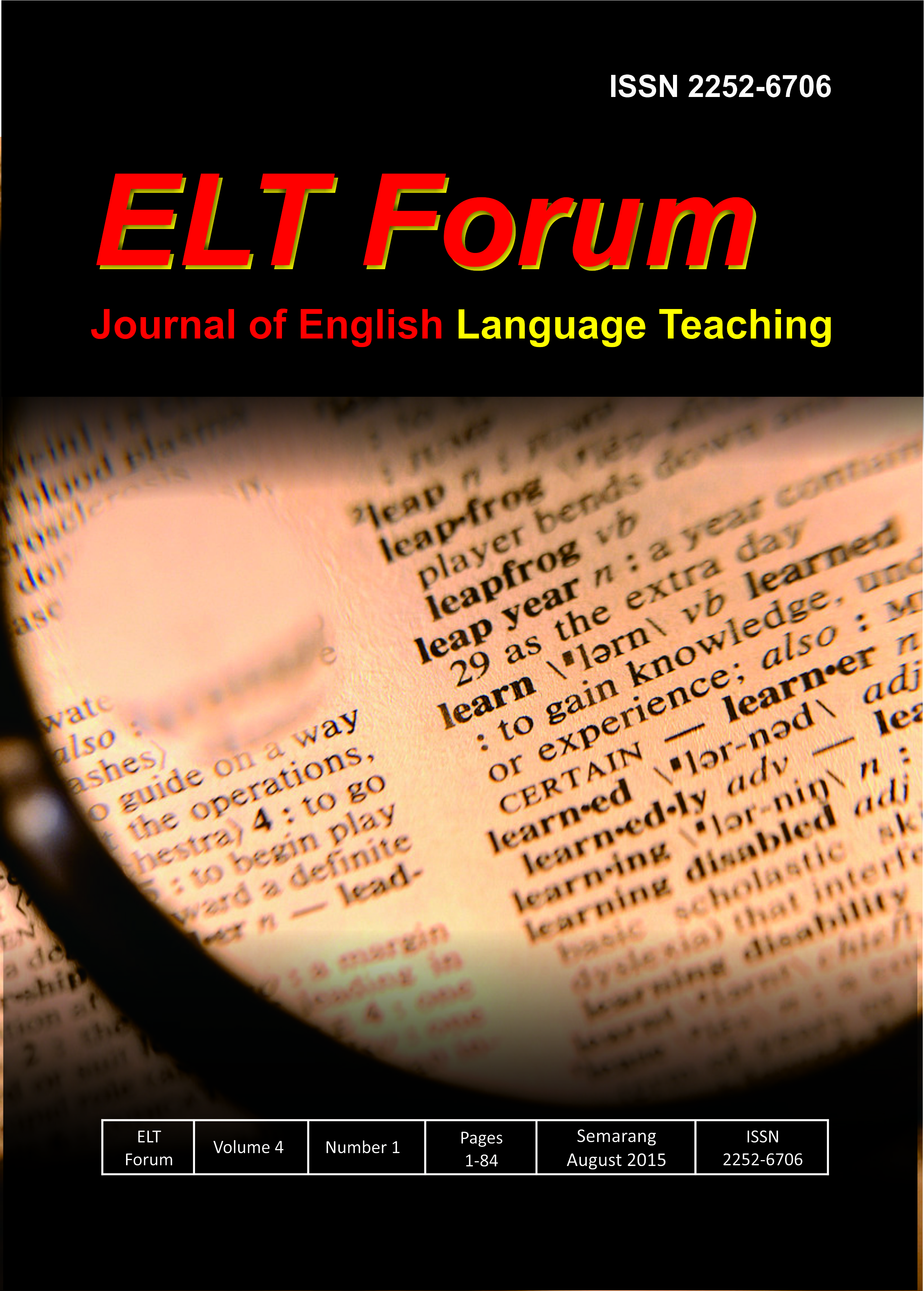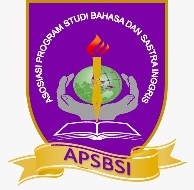THE INTEGRATION OF SECOND CORE COMPETENCE (KI 2) OF CURRICULUM 2013 IN ENGLISH CLASSES
Abstract
This final project is based on a study which attempted to describe the integration of character education in a real teaching. The main purpose of the study was to describe how the teachers integrated and assessed (KI 2) or character education to their students in English classes. Three english teachers from two different school levels participated in this research. They taught their students in the class. From the teaching and learning process, the transcriptions which contained teachers’ acts and talks was provided. Then, both teachers’ acts and talks were displayed on a table. They were categorized based on 18 pillars of character education which is proposed by Kemendiknas. After both teachers’ acts and talks were categorized, the researcher explained what methods or strategies were used in integrating and assesing character education. After that, the researcher summarized all the findings from the data and conclude them. Results indicated that all the three teachers who became the source of data have already integrated character education in their class. The first teacher or teacher A integrated discipline and social care. Both discipline and social care are displayed twice on the transcription. The next teacher is teacher B. During her class, she integrated tolerance three times, respect of the achievement three times, social care four times, each democratic, communicative and discipline one time to all her students. The last teacher is teacher C. She did integrate curiosity once, religious for four times and both tolerance and democratic twice. Charater education has already integrated by all teacher in each class. There was no new strategy which was used by all the teachers in integrating character education. The strategies which were mostly used by the teachers were only in the form of advice. In addition, there was no strategy which was used by the teachers to assess character education. This could happen because the teachers did not do any single assessment to character education which they have transferred on that day.
Â
References
Aqib, Zainal dan Sujak. 2011. Panduan Aplikasi Pendidikan Karakter. Bandung: Yrama Widya.
Bramantyo. 2013. Astaga, 49,3% guru di Indonesia belum sarjana. Online at http://kampus.okezone.com/read/2013/03/08/373/772874/astaga-49-3-guru-di-indonesia-belum-sarjana [ accessed 4/10/2014]
Berkowitz, Marvin W. 2012. Understanding Effective Character Education. Online at http://www.character.org/wp-content/uploads/2011/12/Understanding-Effective-Character-Education.pdf [accessed 2/11/14]
Berkowitz, M. & Bier, M. (2005). What works in character education. Washington, DC: Character Education Partnership.
Character education. Online at http://www.en.wikipedia.org/wiki/Character¬¬_education [accessed 5/17/2014]
Curriculum. Online at http://id.wikipedia.org/wiki/Kurikulum_2013 [accessed 2/26/2014]
Dama, Alfred. 2013. 11 Kali Ganti Kurikulum Tanpa Evaluasi. Online at http://kupang.tribunnews.com/m/index.php/2013/04/19/tujuh-desa-di-lembata-belum-diakui-kemendagri [accessed 5/30/2014]
Devetak, Iztok. et al. 2009. The Role of Qualitative Research in Science Education. Eurasia Journal of Mathematics, Science & Technology Educatioin. 6(1),77-84
Education. Online at http://www.merriam-webster.com/dictionary/education [accessed 5/30/2014]
Hancock, Beverley. 2002. An Introduction to Qualitative Research (Revised Ed.) Nottingham: Trent Focus Group
Homiak, M. (2007). Moral Character. In Stanford Encyclopedia of Philosophy [Web]. Stanford: The Metaphysics Research Lab, Center for the Study of Language and Information, Stanford University. From http://plato.stanford.edu/archives/spr2007/entries/moral-character/ [accessed 5/30/2014]
Kelly, A.V. 2004. The Curriculum: Theory and Practice (5th Ed.). London: SAGE Publication
Kemendikbud. 2013. Kurikulum 2013: Kompetensi Dasar SMP/MTs. Jakarta: Badan Penelitian dan Pengembangan.
Kemendikbud. 2013. Kurikulum 2013: Kompetensi Dasar SMA/MAN. Jakarta: Badan Penelitian dan Pengembangan.
Kemendikbud. 2013. Desain Induk Kurikulum 2013. Jakarta: Badan Penelitian dan Pengembangan.
Hasan, Said Hamid et al. 2010. Bahan Pelatihan: Penguatan Metodologi Pembelajaran Berdasarkan Nilai-Nilai Budaya untuk Membentuk Daya Saing dan Karakter Bangsa. Jakarta: Badan Penelitian dan Pengembangan
Josephson, Michael. (n.d.) The Six Pillars of Character. Online at http://josephsoninstitute.org/MED/MED-2sixpillars.html [30/5/2014]
Kurikulum Harus Diperbaharui Sesuai Jamannya. Online at http://m.poskotanews.com/2013/09/07/kurikulum-harus-diperbaharui-sesuai-jamannya/?wpmp_switcher=mobile [accessed 5/30/2014]
Lickona, Thomas. 1991. Educating for Character: How Our Schools Can Teach Respect and Responsibility. USA: Bantam Books
Meaning, Scope & Function of Philosophy of Education. Online at http://www.mu.ac.in/myweb_test/ma%20edu/M.A.%20Edu.%20Philosophy.pdf [accessed 5/30/2014]
Miles, M. B. & Huberman, A. M. (1984). Qualitative Data Analysis: A Sourcebook of New Methods. California: SAGE publications Inc.
Mujiyanto, Yan. 2011. Petunjuk Penulisan Skripsi.Semarang: Unnes Press.
Murnika, Rina. 2013. Integrasi Pendidikan Karakter Dalam Pembelajaran Ilmu Pengetahua Alam (IPA) pada Siswa Kelas V MIN Yogyakarta I. (Skripsi UIN Sunan Kalijaga Yogyakarta)
Muslich, Masnur. 2011. Pendidikan Karakter: Menjawab Tantangan Multidimensional. Jakarta: Bumi Aksara.
Null, Wesley. 2011. Curriculum: From Theory to Practice. UK: Rowman & Littlefield Publishers, Inc.
Parlina, Ina. 2012. KPK names Angelina a suspect in bribery case. The Jakarta Post. Page 1
Richards, Jack C. 2013. Curriculum Approaches in Language Teaching: Forward, Central, and Backward Design. RELC Journal, 44(1) 5–33.
Punch, Keith F. (2005). Introduction to Social Research–Quantitative & Qualitative Approaches. London: Sage
Reardon, Crystal. (2006). Character Educatio: Informational Handbook and Guide II. North Carolina: SHS Design
Schwartz, Merley. et al. 2008. Effective Character Education. Newyork: McGraw Hill Companies.
Setiawan, Rendik. (n.d.) Masalah pendidikan di Indonesia dan solusinya. Online at http://positivego.blogspot.com/2012/11/masalah-pendidikan-di-indonesia.html [accessed 2/10/14]
Suwarni, Yuli Tri. 2013. One dead in Bogor student brawl. The Jakarta Post. Page 1.
The Eleven Principles of Effective Character Education. Online at http://www.character.org/uploads/PDFs/ElevenPrinciples_new2010.pdf [accessed 30/5/2014]
Tri Pusat Pendidikan. Online at http://titinkita.blogspot.com/2013/04/tri-pusat-pendidikan.html [accessed 5/17/2014]
Undang-Undang No. 20 Tahun 2003 Sistem Pendidikan Nasional. Online at http://www.slideshare.net/srijadi/uu-no-20-2003-sistem-pendidikan-nasional [ accessed 2/10/14]
Wibowo, Tedy. 2012. Grand Design Pendidikan Karakter.
Wibowo, Tedy. 2012. Integrasi Pendidikan Karakter Secara Terpadu dalam Pembelajaran.
Zacharias, N.T. 2012. Qualitative Research Methods for Second Language Education: A Coursebook. Online at: http://www.c-s-p.org/flyers/978-1-4438-3505-3-sample.pdf [accessed 21/01/14]



_.jpg)
_.jpg)




